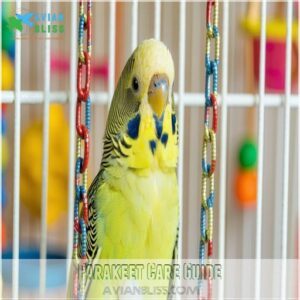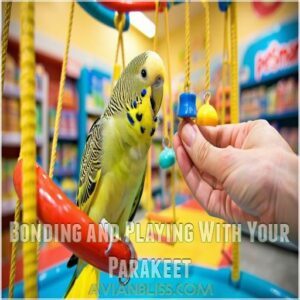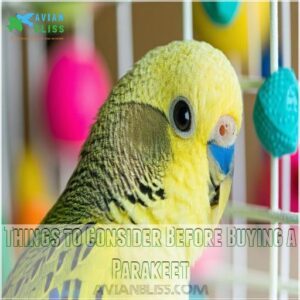This site is supported by our readers. We may earn a commission, at no cost to you, if you purchase through links.

First, parakeets are social, energetic birds that thrive with interaction—so they’ll need your time or even a companion bird to avoid loneliness.
Second, the initial cost ($20-$40) is just the start; you’ll also spend on a cage (minimum 18x18x24 inches), toys, and food.
Third, a proper diet includes fresh veggies, seeds, and pellets—not just treats!
Fourth, their health depends on a clean cage and regular vet visits to avoid common issues like respiratory infections. Ethical concerns are also important to consider.
Table Of Contents
- Key Takeaways
- Parakeet Care Guide
- Setting Up Your Parakeet’s Home
- Proper Nutrition for Parakeets
- Bonding and Playing With Your Parakeet
- Maintaining The Health of Your Parakeet
- Things to Consider Before Buying a Parakeet
- The Types of Parakeets Available at PetSmart
- The Cost of Buying a Parakeet From PetSmart
- Tips for Shopping at PetSmart for Parakeet Supplies
- Preparing Your Home for a New Parakeet
- Frequently Asked Questions (FAQs)
- Should you buy a parakeet at PetSmart?
- What birds can I buy at PetSmart?
- How much does a parakeet cost?
- What do you need to buy a parakeet?
- Should you buy a parakeet from a pet store?
- Does Petco sell parakeets?
- What is the Average Cost of a Parakeet at PetSmart?
- How Often Should I Take My Parakeet to the Vet for Check-ups?
- Can Parakeets Be Trained to Do Tricks?
- What Are Some Common Behavioral Issues in Parakeets and How Can I Address Them?
- Conclusion
Key Takeaways
- You’ll need a spacious cage (at least 18x18x24 inches), toys, and a balanced diet of seeds, pellets, and fresh vegetables to meet your parakeet’s needs.
- Parakeets thrive on social interaction, so plan for regular bonding time or consider a companion bird to prevent loneliness.
- Regular vet check-ups and a clean environment are essential to maintain their health and spot early signs of illness.
- Before buying, think about ethical concerns and consider adopting from a shelter or rescue organization for a more responsible choice.
Parakeet Care Guide
Ready to bring home a feathered friend from PetSmart? Your parakeet’s care is key to a happy, healthy companion.
Start with the right cage – aim for at least 18 x 18 x 24 inches – positioned away from drafty spots and at eye level or below, and be sure to research the ideal parakeet cage size to guarantee your bird’s comfort. Think of the cage as your bird’s personal castle, complete with a comfy paper-lined floor that gets changed every other day.
Nutrition is where the magic happens. Mix up their diet with 15-25% pellets, 50-60% seed blend, and sprinkle in fresh veggies and fruits.
But here’s the real secret: toys, toys, toys! These little guys need mental stimulation more than you might think. Bells, swings, and chew toys aren’t just fun – they’re essential for keeping your parakeet’s mind sharp and spirits high.
Get ready for a chirpy adventure!
Setting Up Your Parakeet’s Home
After bringing home your feathered friend from PetSmart, creating the perfect parakeet paradise is your next mission. Your bird’s home isn’t just a cage—it’s a sanctuary that’ll make or break their happiness.
When setting up your parakeet’s living space, keep these key points in mind:
- Cage Dimensions: Aim for a minimum 18 x 18 x 24 inch cage, giving your bird room to spread its wings and explore
- Bar Spacing: Make certain the cage’s bar spacing is less than 1/2 inch to prevent escapes and injuries
- Strategic Placement: Position the cage away from drafts, windows, and high-traffic areas to minimize stress
- Comfort Essentials: Install multiple perches at different heights, install built-in feeders, and engaging toys
Your parakeet needs a setup that’s part fortress, part playground. Think of it like designing a tiny studio apartment for your most feathered roommate—comfort, safety, and entertainment are non-negotiable.
Proper Nutrition for Parakeets
Now that you’ve set up the perfect parakeet paradise, let’s talk about keeping your feathered friend healthy from the inside out. Nutrition isn’t just fuel – it’s the secret sauce to a happy, vibrant parakeet that’ll chirp its way into your heart. For a convenient and wide selection of parakeet food options, including PetSmart parakeet food, you can explore online marketplaces.
| Food Type | Percentage | Frequency | Notes |
|---|---|---|---|
| Pellets | 15-25% | Daily | Nutritional foundation |
| Seed Blend | 50-60% | Daily | Primary diet component |
| Fresh Veggies | Every other day | Regular | Dark leafy greens |
| Fresh Fruits | Regular | Occasional | Berries, melons |
Imagine your parakeet’s diet as a balanced buffet that keeps them singing and thriving. Pelleted food serves as the nutritional powerhouse, packed with essential vitamins and minerals. Your seed blend acts like the main course – filling and satisfying. But here’s the trick: don’t go overboard. Too much of a good thing can turn your chirpy companion into a feathered couch potato.
Sprinkle in fresh vegetables like a nutritional confetti – dark leafy greens that’ll make your bird’s feathers shine brighter than a new penny. Fruits are the dessert – think berries or melon chunks that’ll have your parakeet doing a happy dance. Pro tip: treats like honey sticks or millet spray? Save those for special occasions – once a month max.
Remember, a well-fed parakeet is a happy parakeet. Your local PetSmart offers everything you’ll need to keep your new buddy in tip-top shape.
Bonding and Playing With Your Parakeet
When diving into parakeet playtime, you’ll discover a world of feathered friendship that transforms your new pet from a mere companion to a true buddy.
Here’s your healthy parakeet checklist for building trust and connection:
- Hand-feed treats to break the ice and show you’re a friend, not a threat
- Teach simple training tricks like stepping up or mimicking short words
- Sing and whistle to engage their musical side and encourage interaction
- Create daily bonding sessions that make handling safely feel natural
Your parakeet craves social connection, so approach with patience. Speak softly, move slowly, and let them set the pace. With consistent, gentle interaction, you’ll soon have a chatty, affectionate feathered friend who can’t wait to see you.
Maintaining The Health of Your Parakeet
Just as you’ve learned to connect with your feathered friend through play, your parakeet’s wellness becomes your next mission. Your parakeet’s wellness depends on sharp observation and proactive care. Spotting early signs of illness can mean the difference between a quick recovery and a serious problem.
Maintaining proper cage hygiene through regular cleaning and disinfection, as part of preventing parakeet health issues, is essential in keeping your parakeet healthy and thriving.
| Symptom | Warning Sign | Action Needed |
|---|---|---|
| Lethargy | Low energy | Vet check |
| Feather Changes | Dull/missing feathers | Immediate exam |
| Respiratory Issues | Sneezing/discharge | Urgent care |
| Appetite Changes | Not eating | Diet assessment |
| Behavioral Shifts | Unusual aggression | Stress evaluation |
Regular check-ups, a balanced diet rich in pellets and fresh vegetables, and maintaining a clean environment are your best defenses against parakeet illnesses. Watch for subtle changes – your keen observation could save your bird’s life.
Things to Consider Before Buying a Parakeet
Before bringing a parakeet home from PetSmart, you’ll need to carefully assess whether you’re ready for the long-term commitment of bird ownership.
Consider the financial costs.
Consider the daily care requirements.
Consider the potential 7-10 year lifespan that’ll transform your home and daily routine.
Health Risks Associated?
After keeping your parakeet healthy through proper diet and care, you’ll want to know the potential health risks that could throw a wrench in your birdie buddy’s well-being.
Parakeet diseases like Salmonella, Psittacosis, and respiratory infections can sneak up quickly.
Regular check-ups with an avian vet, maintaining a clean environment, and watching for early warning signs are your best defense against these pesky health challenges.
Ethical Concerns Regarding?
In the murky world of pet store sourcing, buying a parakeet from PetSmart raises serious ethical eyebrows.
Breeders’ practices often prioritize profit over animal welfare, leading to overbreeding and potential health issues.
To learn more about responsible parakeet breeding, consider the importance of Parakeet breeder ethics.
Your responsible pet ownership journey starts with understanding these concerns.
Before bringing home a feathered friend, consider the deeper implications of your purchase and the parakeet’s well-being.
Alternatives to Buying?
When ethical concerns about pet store parakeets weigh heavy, consider alternative paths to feathered friendship.
Rescue organizations and local bird shelters offer loving parakeets seeking forever homes.
Adoption saves a life and often provides healthier, well-socialized birds at a fraction of PetSmart prices.
You’ll also feel good knowing you’ve given a bird a second chance, and that’s in addition to the knowledge of having made a more cost-effective decision. Rescue organizations and shelters are a great alternative path.
The Types of Parakeets Available at PetSmart
If you’re ready to bring home a feathered friend, PetSmart offers a colorful array of parakeets that’ll make your heart flutter. These charming birds come in a stunning variety of color variations – from sunshine yellows to vibrant blues and greens – each with its own unique personality.
PetSmart typically sells budgies (the most common type of parakeet) that range in temperament from social butterflies to more reserved companions. Size differences matter too: most parakeets at PetSmart are relatively small, measuring around 7-12 inches, making them perfect for apartments or smaller living spaces.
As with any parakeet, including American and English budgies, understanding their origin and history before making a decision is vital.
When choosing your new winged buddy, you’ll want to observe their personalities. Some parakeets are chatterboxes, while others are more laid-back. The birds usually start at six months old and come with basic health checks.
Pro tip: spend a few minutes interacting with potential pets to find your perfect match. Remember, these little guys typically live 7-10 years, so you’re making a real commitment to a tiny, feathered family member.
The Cost of Buying a Parakeet From PetSmart
Ready to welcome a feathered friend from PetSmart? Your parakeet adventure starts with understanding the real wallet impact.
At PetSmart, parakeets typically range from $20 to $40, but that’s just the beginning of your financial journey. Remember that rare color mutations can substantially increase the initial cost.
Budget-conscious bird lovers should prep for additional expenses that’ll ruffle your wallet’s feathers. A quality cage runs $50 to $100, while monthly food costs hover around $10 to $20. Don’t forget enrichment toys, which can add another $10 to $20 monthly.
Annual veterinary check-ups will set you back $50 to $100.
These colorful companions aren’t just a one-time purchase – they’re a long-term commitment that requires smart financial planning. Before bringing home your chirpy new friend, crunch those numbers and make certain you’re ready for the full parakeet package at PetSmart.
Tips for Shopping at PetSmart for Parakeet Supplies
Your parakeet shopping adventure at PetSmart demands strategic preparation to create a paradise for your feathered friend. Browsing the bird supply aisle requires more than just grabbing the first shiny accessories you see.
Here are key considerations for equipping your new companion:
- Cage Selection: Choose a spacious habitat that allows your parakeet to spread its wings – literally! The minimum 18 x 18 x 24 inch cage provides room to explore and play.
- Accessory Essentials: Invest in sturdy, easily attachable food and water bowls that can withstand playful pecking and daily cleaning, and make sure to provide a mesh seed catcher to keep the cage clean.
- Enrichment Arsenal: Stock up on a variety of toys – think natural wood perches, bell-adorned swings, and interactive playthings that’ll keep your bird stimulated and physically active.
PetSmart’s bird section offers everything you’ll need to transform a simple cage into a vibrant paradise that’ll make your parakeet chirp with joy!
Preparing Your Home for a New Parakeet
Nestled in the perfect spot, your new parakeet’s home requires careful planning to create a safe and stimulating environment. When buying a parakeet from PetSmart, start by selecting a cage that’s at least 18 x 18 x 24 inches – giving your feathered friend room to spread its wings and explore. Secure food and water bowls strategically, attaching them firmly to prevent messy spills that’ll have you cleaning up more than just bird droppings.
Enrichment is key to a happy parakeet habitat. Stock up on toys from PetSmart’s bird section – think bells, swings, and chew toys that’ll keep your bird mentally stimulated and physically active. Arrange multiple perches at different heights, creating a mini playground that challenges and delights your new companion.
Location matters more than you might think. Avoid drafty windows, noisy areas, and temperature-sensitive spots like air conditioning vents. Instead, place the cage in a family-friendly area where your parakeet can feel part of the action without being overwhelmed. Pro tip: birds are social creatures, so choose a spot where they can watch household activities and feel connected.
Birdproofing isn’t just a suggestion – it’s a must for keeping your new feathered friend safe and sound.
Frequently Asked Questions (FAQs)
Should you buy a parakeet at PetSmart?
Buying a parakeet at PetSmart can be convenient, but consider their origins and potential health.
Research care costs.
Make certain you’re ready for a long-term commitment.
Think about adopting a companion if you’ll be away often.
What birds can I buy at PetSmart?
At PetSmart, you’ll find parakeets, finches, canaries, diamond doves, cockatiels, and occasionally conures.
Each bird has unique needs and personalities.
Choose one that fits your space, time, and commitment comfortably.
How much does a parakeet cost?
A parakeet typically costs $40 at PetSmart, with fancier types priced higher.
However, plan for additional expenses like a cage, toys, and food.
Owning one is affordable, but the companionship they bring is priceless.
What do you need to buy a parakeet?
You’ll need a spacious cage (18x18x24 inches minimum).
food (pellets, seeds, veggies), water and food dishes.
perches, toys for mental stimulation.
bedding, and a cage cover to provide a cozy environment.
Should you buy a parakeet from a pet store?
Picking a parakeet from a pet store can work, but consider adoption first.
Pet store birds may face stress and health issues.
Research the store’s reputation, ask questions, and verify humane practices before making a choice.
Does Petco sell parakeets?
Sure, Petco sells parakeets, typically priced around $
They’re available in-store, not online.
If you’re planning to bring one home, remember the extra costs for cages, toys, and food—it’s more than just the bird!
What is the Average Cost of a Parakeet at PetSmart?
Parakeets at PetSmart typically cost around $40, though fancy varieties may be priced higher.
Keep in mind, you’ll also need to budget for a cage, food, and accessories to facilitate proper care.
How Often Should I Take My Parakeet to the Vet for Check-ups?
Take your parakeet to the vet once a year for a check-up.
Regular visits catch health issues early and keep your bird happy and thriving.
Schedule sooner if they seem off—better safe than sorry!
Can Parakeets Be Trained to Do Tricks?
Absolutely, you can train your parakeet to do tricks with patience and positive reinforcement.
Simple commands like “step up,” whistling tunes, or even talking are achievable.
Consistent interaction and tasty rewards will work wonders!
What Are Some Common Behavioral Issues in Parakeets and How Can I Address Them?
Feather plucking, biting, and excessive squawking happen when parakeets feel bored or stressed.
Keep your bird mentally stimulated with toys, daily interaction, and a buddy.
A clean, spacious cage and a healthy diet help too.
Conclusion
Bringing home parakeets is like starting a new chapter—you’re setting up a life full of chirps, color, and energy.
Before buying parakeets at PetSmart, remember their needs: space to thrive, a balanced diet, regular health care, and plenty of attention.
These little birds aren’t just decorations; they’re companions that depend on you.
If you’ve done your homework and feel ready, they can bring joy to your home. Make informed choices, and your feathered friends will flourish.











